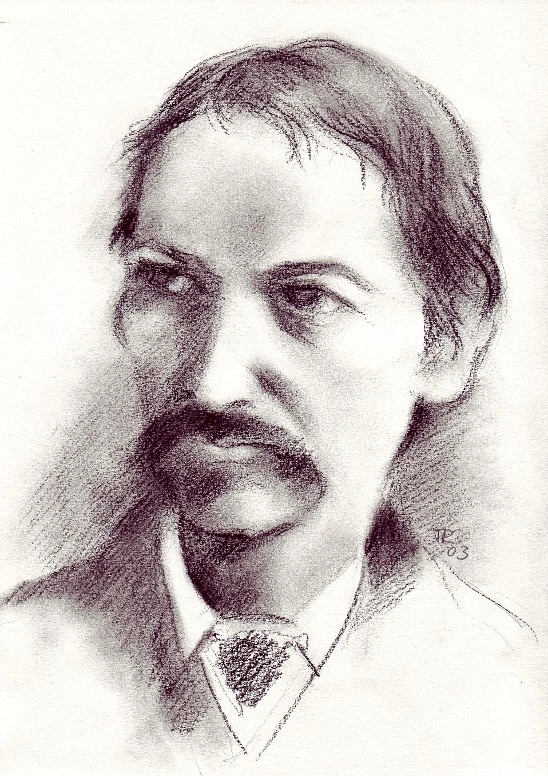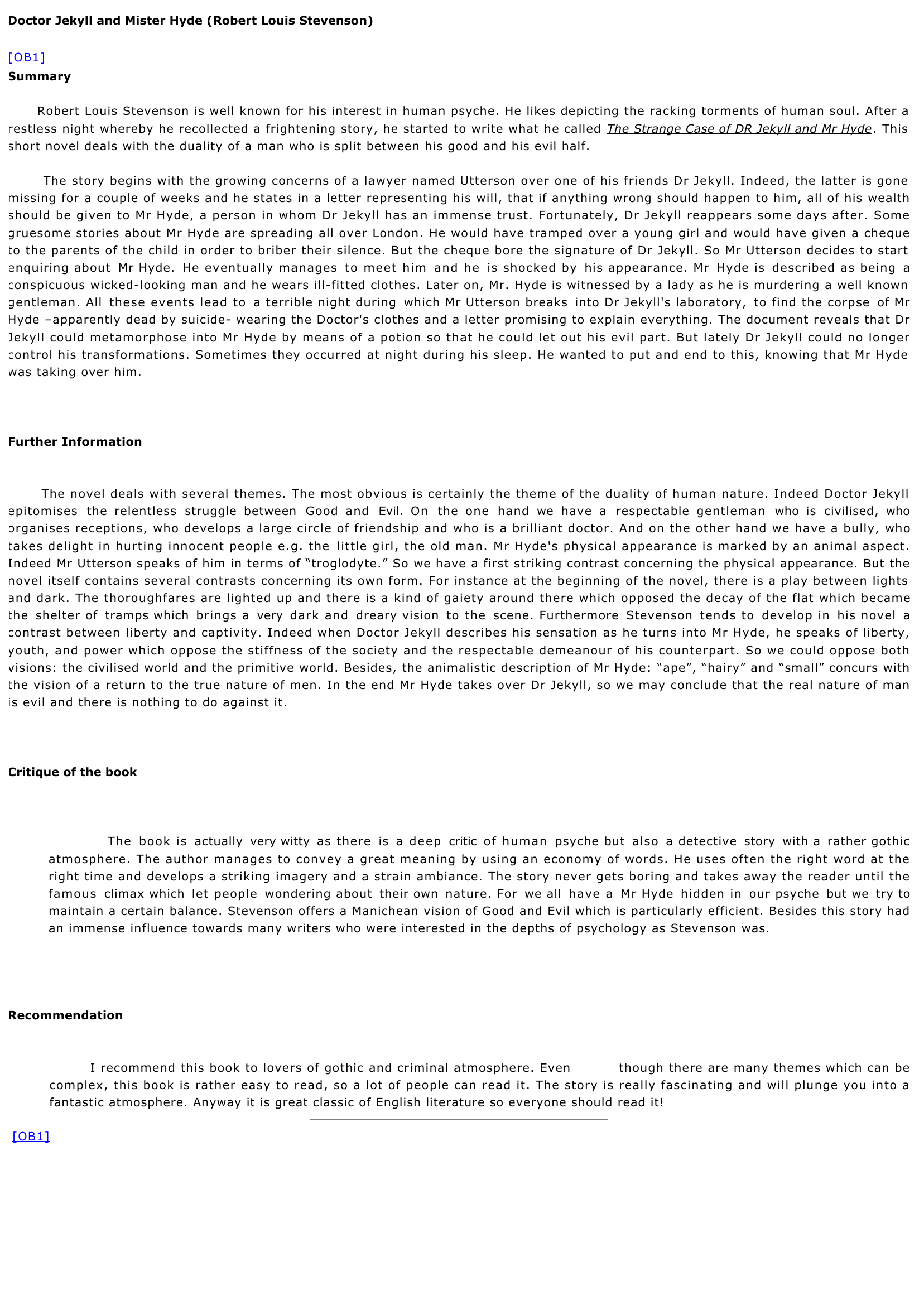Robert Louis Balfour STEVENSON: Dr Jekyll et Mr Hyde (Résumé & Analyse)
Publié le 22/02/2012
Extrait du document


«
Doctor Jekyll and Mister Hyde (Robert Louis Stevenson) [OB1] Summary
Robert Louis Stevenson is well known for his interest in human psyche.
He likes depicting the racking torments of human soul.
After a restless night whereby he recollected a frightening story, he started to write what he called The Strange Case of DR Jekyll and Mr Hyde .
This short novel deals with the duality of a man who is split between his good and his evil half.
The story begins with the growing concerns of a lawyer named Utterson over one of his friends Dr Jekyll.
Indeed, the latter is gone missing for a couple of weeks and he states in a letter representing his will, that if anything wrong should happen to him, all of his wealthshould be given to Mr Hyde, a person in whom Dr Jekyll has an immense trust.
Fortunately, Dr Jekyll reappears some days after.
Somegruesome stories about Mr Hyde are spreading all over London.
He would have tramped over a young girl and would have given a chequeto the parents of the child in order to briber their silence.
But the cheque bore the signature of Dr Jekyll.
So Mr Utterson decides to startenquiring about Mr Hyde.
He eventually manages to meet him and he is shocked by his appearance.
Mr Hyde is described as being aconspicuous wicked-looking man and he wears ill-fitted clothes.
Later on, Mr.
Hyde is witnessed by a lady as he is murdering a well knowngentleman.
All these events lead to a terrible night during which Mr Utterson breaks into Dr Jekyll's laboratory, to find the corpse of MrHyde –apparently dead by suicide- wearing the Doctor's clothes and a letter promising to explain everything.
The document reveals that DrJekyll could metamorphose into Mr Hyde by means of a potion so that he could let out his evil part.
But lately Dr Jekyll could no longercontrol his transformations.
Sometimes they occurred at night during his sleep.
He wanted to put and end to this, knowing that Mr Hydewas taking over him.
Further Information
The novel deals with several themes.
The most obvious is certainly the theme of the duality of human nature.
Indeed Doctor Jekyll epitomises the relentless struggle between Good and Evil.
On the one hand we have a respectable gentleman who is civilised, whoorganises receptions, who develops a large circle of friendship and who is a brilliant doctor.
And on the other hand we have a bully, whotakes delight in hurting innocent people e.g.
the little girl, the old man.
Mr Hyde's physical appearance is marked by an animal aspect.Indeed Mr Utterson speaks of him in terms of “troglodyte.” So we have a first striking contrast concerning the physical appearance.
But thenovel itself contains several contrasts concerning its own form.
For instance at the beginning of the novel, there is a play between lightsand dark.
The thoroughfares are lighted up and there is a kind of gaiety around there which opposed the decay of the flat which becamethe shelter of tramps which brings a very dark and dreary vision to the scene.
Furthermore Stevenson tends to develop in his novel acontrast between liberty and captivity.
Indeed when Doctor Jekyll describes his sensation as he turns into Mr Hyde, he speaks of liberty,youth, and power which oppose the stiffness of the society and the respectable demeanour of his counterpart.
So we could oppose bothvisions: the civilised world and the primitive world.
Besides, the animalistic description of Mr Hyde: “ape”, “hairy” and “small” concurs withthe vision of a return to the true nature of men.
In the end Mr Hyde takes over Dr Jekyll, so we may conclude that the real nature of manis evil and there is nothing to do against it.
Critique of the book
The book is actually very witty as there is a deep critic of human psyche but also a detective story with a rather gothic atmosphere.
The author manages to convey a great meaning by using an economy of words.
He uses often the right word at theright time and develops a striking imagery and a strain ambiance.
The story never gets boring and takes away the reader until thefamous climax which let people wondering about their own nature.
For we all have a Mr Hyde hidden in our psyche but we try tomaintain a certain balance.
Stevenson offers a Manichean vision of Good and Evil which is particularly efficient.
Besides this story hadan immense influence towards many writers who were interested in the depths of psychology as Stevenson was.
Recommendation
I recommend this book to lovers of gothic and criminal atmosphere.
Even though there are many themes which can be complex, this book is rather easy to read, so a lot of people can read it.
The story is really fascinating and will plunge you into afantastic atmosphere.
Anyway it is great classic of English literature so everyone should read it!
[OB1].
»
↓↓↓ APERÇU DU DOCUMENT ↓↓↓
Liens utiles
- Robert Louis Balfour STEVENSON : Le Cas étrange du Dr Jekyll et Mr. Hyde
- Robert Louis Balfour STEVENSON: L'île au trésor (Résumé & Analyse)
- ROMAN DU PRINCE OTHON (Le) de Robert Louis Stevenson (résumé & analyse)
- DANS LES MERS DU SUD (résumé & analyse) Robert Louis Stevenson
- VEILLÉES D’OCÉANIE Robert Louis Stevenson (résumé & analyse de l’oeuvre)


